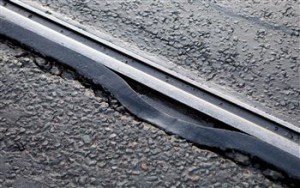
Serious cracking has appeared in the tarmac and rubber track edging along the length of Princes Street.
One expert said today (Thu) the cracking was significant and would prove costly and disruptive to repair.
The news comes in the same week it was revealed that trams would only run for half a mile when the service starts later this year.
The project has been mired in delays, cutbacks and arguments and critics of the trams said the cracks were yet another reason the project should never have got off the ground.
Photographs taken this week suggest that the tarmac surrounding the tram lines is beginning to disintegrate. The same pictures show the rubber lining is deformed.
The same damage has been observed the length of Princes Street.
An expert in civil engineering, who asked not to be named, has studied the images and concluded: “Repair work will be required, at least to the road surfacing adjacent to the tracks. The polymer sound and vibration isolation strip will also need to be replaced locally.”
The expert said the cause was most likely a combination of the design of the tracks, construction method, the quality of installation work, and “external influence”.
He said: “This damage has probably been caused by road traffic and possibly the extreme weather we have suffered recently, although the new construction for the tram track should have been more resistant to the frost, than some other roads.”
He warned: “Addressing the symptoms in any repair work will not necessarily be successful in the long term and may not prevent a recurrence.
It would be reasonable to assume that the problem is not restricted to the length observed.”
And he concluded: “It would be safe to say that the repair will be costly and disruptive.”
“Trams bosses have previously refused to comment on rumours that Princes Street would be closed again for this type of work. It’s time for them to come clean on this.
“We also need to know why this has happened. The track laying on Princes Street was earlier criticised as a ‘rush job’. Is this what has caused the problem? And will this prove to be a recurring problem if trams ever get up and running?”
Cllr Gordon Mackenzie, the city council’s transport convenor, suggested the contractor would have to pick up the extra bill, which could hit hundreds of thousands of pounds.
He said: “Within the Tram contract there is provision that these works will be completed at the full expense of the contractor, not the public purse, and these works are carried out when it has the least amount of impact on traffic, often overnight.”
A spokesman for Transport Initiatives Edinburgh (TIE), the body responsible for the tram project, said: “There is a framework for remedial work to take place.”
The spokesperson suggested that the recent belt of cold weather had also made an impact to the condition of the tramlines.
No-one was available for comment from contractor Bilfinger and Berger.